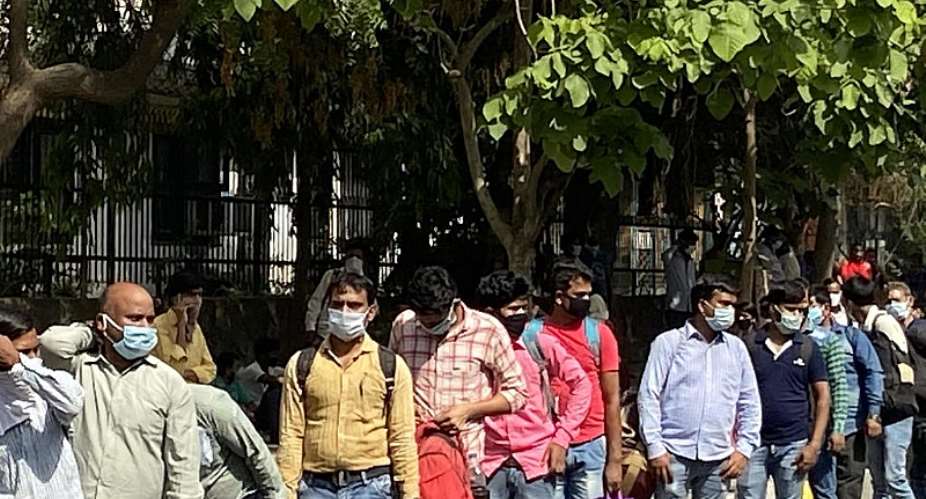The Covid-19 crisis is having a devastating effect on the education and training of young people according to a survey by the International Labour Organization. India is a case in point.
Half of the world's youth is subject to anxiety or depression-causing circumstances and more than a third are uncertain of their future career prospects because of the Covid-19 pandemic.
In India, the proportion of young workers affected by the crisis appears to be even higher.
About 41% of people aged between 15-29 were out of work in May, with 27 million people aged between 20 and 30 losing their jobs in April, according to data compiled by the Centre for Monitoring the Indian Economy (CMIE). That is up from 17% in 2018-19.
Long term impact of pandemic
“The long-term impact of the pandemic will be very severe and take a long time to fix,” said Mahesh Vyas, the CEO of CMIE.
The International Labour Organization (ILO) report Youth and Covid-19: impacts on jobs, education, rights and mental well-being which was released Wednesday captures the immediate effects of the pandemic on the lives of young people (aged 18–29) with regards to employment, education, mental well-being, rights and social activism.
Over 12,000 responses were received from young people in 112 countries.
In India,“the pandemic is inflicting multiple shocks on young people. It is not only destroying their jobs and employment prospects, but also disrupting their education and training and having a serious impact on their mental well-being. We cannot let this happen,” said ILO Director-General Guy Ryder.
According to the CMIE, with millions of fresh graduates entering the workforce year-on-year, exacerbating the labor surplus, the 'demographic dividend' that comes with having a large youth population is at risk of turning into a 'demographic demon'.
The report found that one in two (50%) young people across the world are possibly subject to anxiety or depression, while 17% are probably affected by it.
“Severe disruption to learning and working, compounded by the health crisis, has seen deterioration in young people's mental well-being,” the survey said.
According to the ILO report, 38% of young people are uncertain of their future career prospects, with the crisis expected to create more obstacles in the labor market and to lengthen the transition from school to work.
Concerned about the future
Some have already felt a direct impact, with one in six youth having to stop work since the onset of the pandemic. Many younger workers are more likely to be employed in highly affected occupations, such as support, services and sales-related work, making them more vulnerable to the economic consequences of the pandemic.
Mental well-being is lowest for young women and younger youths between the ages of 18 and 24 years.
Young people whose education or work were either disrupted or had stopped completely were almost twice as likely to be affected by anxiety or depression as compared to those who continued to be employed or whose education was not affected.
Another study conducted in India by GOQii, a smart-tech enabled preventive healthcare platform, surveyed over 10,000 Indians to understand how they have been coping with the new normal.
According to the study, 26% of respondents were suffering from mild depression, 11% were feeling moderately depressed, and 6% were facing severe symptoms of depression.
“Copious amounts of stress can lead to depression. The lockdown and lifestyles drastically changing showed that 43% of Indians are currently plagued with depression and are learning to cope with it, the study said.
India's demographics are the envy of the world. As populations in countries such as China, US, and Japan is getting older, India's population is getting younger.
Half of its population is under the age of 25. Two-thirds are under 35.
The ILO has urged governments to help reintegrate jobless youth into labor markets, or provide educational training and unemployment insurance benefits.





 Tuesday’s downpour destroys ceiling of Circuit Court '8' in Accra
Tuesday’s downpour destroys ceiling of Circuit Court '8' in Accra
 SOEs shouldn't compromise on ethical standards, accountability – Akufo-Addo
SOEs shouldn't compromise on ethical standards, accountability – Akufo-Addo
 Father of 2-year-old boy attacked by dog appeals for financial support
Father of 2-year-old boy attacked by dog appeals for financial support
 Jubilee House National Security Operative allegedly swindles businessman over sa...
Jubilee House National Security Operative allegedly swindles businessman over sa...
 Nobody can order dumsor timetable except Energy Minister – Osafo-Maafo
Nobody can order dumsor timetable except Energy Minister – Osafo-Maafo
 Mahama wishes National Chief Imam as he clock 105 years today
Mahama wishes National Chief Imam as he clock 105 years today
 J.B.Danquah Adu’s murder trial: Case adjourned to April 29
J.B.Danquah Adu’s murder trial: Case adjourned to April 29
 High Court issues arrest warrant for former MASLOC Boss
High Court issues arrest warrant for former MASLOC Boss
 Align academic curriculum with industry needs — Stanbic Bank Ghana CEO advocates
Align academic curriculum with industry needs — Stanbic Bank Ghana CEO advocates
 Election 2024: We'll declare the results and let Ghanaians know we've won - Manh...
Election 2024: We'll declare the results and let Ghanaians know we've won - Manh...
